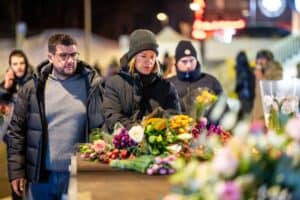'South Africa’s tourism industry is what offers our economy hope. It creates employment, it transfers skills, and it is sustainable.'

William Stephens has had what many people would consider a dream career: developing luxury bush lodges and accommodation in the most beautiful wild areas of southern Africa.
So, he knows better than most what memorable experiences we have to offer tourists, both local and from overseas.
“South Africa’s tourism industry is what offers our economy hope. It creates employment, it transfers skills, and it is sustainable.”
And, it’s real, it’s not just PR hype for the socially sensitive foreigners.
Stephens recalls a “gate guard” at one of the properties he was involved in developing who, despite difficult personal circumstances, rose to become a general manager.
“That is how we should be doing things: providing opportunities for people.”
The Covid pandemic hit the tourism sector hard, he said, including the De Hoop Collection, which is a tourist operation out of a public private partnership with Cape Nature Conservation.
“We had a frank talk with the staff; showed them the books and the lack of bookings so that they understood why it was necessary to cut back salaries and costs for a period.”
Because the company had some reserves and because people accepted the belt-tightening on wages and costs, it lost very few staff during the crisis, which meant they could continue to support their families.
“The De Hoop Collection is one of the major employers in the Bredasdorp area of the Western Cape so its contribution to the local economy is significant.
It, together with the partners brought into De Hoop, have contributed close to R500 million annually in the wider area based on a 10 times multiplier.”
Interestingly, the area – one of the last unspoilt seascapes in the country – was once used as a rocket and aircraft testing range by the SA military and the then National Party government used to have private gatherings there, well away from prying eyes.
De Hoop is, says Stephens, “an example of how things should be done when utilising natural and tourist resources as a partnership between business, the government and communities”.
Stephens, who was born in Joburg and educated in Cape Town, before qualifying with a B.Com degree and going into business, was exposed to the bush at an early age.
But it was when he got his private pilot’s licence – and started flying clients and staff around the country to lodges – that he realised the advantage of being able to more easily facilitate concluding sales with clients having limited time availability … flying in and out by air and not wasting days travelling to and from a reserve, and not just a weekend game lodge commuter.
He began putting together syndicate deals for those who wanted to buy shares in wildlife properties – and this led eventually to a full-time business in developing such operations and creating an air charter business.
He was one of the private partner founders of Madikwe Game Reserve in the North West province.
It was launched by the then Bophuthatswana homeland president, Lucas Mangope, on the advice of his senior parks board officials, some of whom had been involved in the launch of the innovative “Campfire” conservation initiative in Zimbabwe.
“Campfire” was the Communal Areas Management Programme for Indigenous Resources. It was aimed at encouraging communities to see the economic benefits of wildlife and, particularly, through tourism.
Madikwe, although it went through some rocky periods, is today a shining example of private-public partnerships which bring benefits to the surrounding communities.
Its lodges are regarded as some of the best in the world in terms of luxury wildlife experience… in a malaria-free area.
ALSO READ: Calls for the government to help boost local travel and tourism
Stephens is proud of the fact that he helped set up one of the first operations in Madikwe – and he still loves Madikwe, he says, but when pushed, he remembered the Tuli Block area of Botswana as one of his favourite places: “We were there in the days when it was rudimentary – paraffin lanterns and basic ablutions – but it is just such a special place.”
And his current business, it is clear, is more than just about making money.
At De Hoop, Stephens is happy that at the main reserve he can offer a range of family-friendly and affordable options, ranging from cottages to campsites.
Elsewhere in De Hoop, there are five-star lodges which have had rave reviews in overseas media.
The operation is part of Cape Country Routes which saw owner-operated and managed accommodation and activity establishments along popular routes in the Western and Eastern Cape coming together to maximise marketing muscle.
Cooperation, more than competition, is how the tourist sector is going to weather bad times and thrive in the good, believes Stephens.
He emphasises that tourism has huge potential to be the engine which keeps on turning and keeps on powering the South African economy.
“It’s renewable, not extractive like mining. All we have to do, as custodians, is ensure we look after our wild spaces and tourist attractions. They are national assets.”






